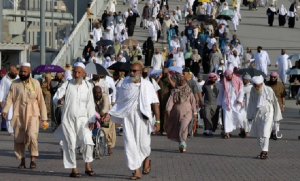Saudi Arabia will allow Hajj pilgrimage for a ‘limited number’ of people this year, due to the continued risk of the coronavirus pandemic, the Ministry of Foreign Affairs (MOFA) said on Monday.
Those people will be of different nationalities and will be people who reside in Saudi Arabia.
Hajj is one of the five pillars of Islam and a must for able-bodied Muslims at least once in their lifetime. Approximately, 2.5 million pilgrims typically visit the holiest sites of Islam in Mecca and Medina for the week-long Hajj.
The ministry stressed in its statement that the Kingdom has always set the safety and security of Muslim pilgrims aiming to perform Hajj and Umrah as a top priority.
“In light of continuation of the pandemic and the risks of Coronavirus spreading in crowded spaces and large gatherings, and its transmission between countries, and the increase in average infections globally, it has been decided that Hajj for this year will be held whereby a very limited number of pilgrims from various nationalities who already reside in Saudi Arabia, would be able to perform it,” MOFA said.
“This decision is taken to ensure Hajj is performed in a safe manner from a public health perspective while observing all preventative measures and the necessary social distancing protocols to protect human beings from the risks associated with this pandemic and in accordance with the teachings of Islam in preserving the lives of human beings.”
This year’s Hajj is expected to start towards the end of July.
In late February, Saudi Arabia announced the temporary suspension of entry for individuals seeking to perform Umrah pilgrimage in Mecca or visiting the Prophet’s Mosque in Medina, as part of the measures to contain the spread of COVID-19.
On March 4, the Kingdom also suspended Umrah pilgrimage for its citizens and residents. By mid-March, the Kingdom had suspended performing group Friday and daily prayers in all of its mosques as a precaution against the coronavirus as well.
However, the Kingdom had started at the end of May implementing its phased re-opening plan.
It shortened curfew, allowed the resumption of some economic activities, allowed performing group prayers in mosques, the return of public and private employees to work from their offices, the resumption of dine-in services in restaurants and cafes, the operation of domestic flights, among others.
The third stage of the Kingdom’s re-opening plan started on Sunday, which dictated that Saudi Arabia will return to “normalcy” in all areas in the Kingdom, except in Mecca, and restore conditions to how life was before implementing curfews.
Alarabiya










Comments